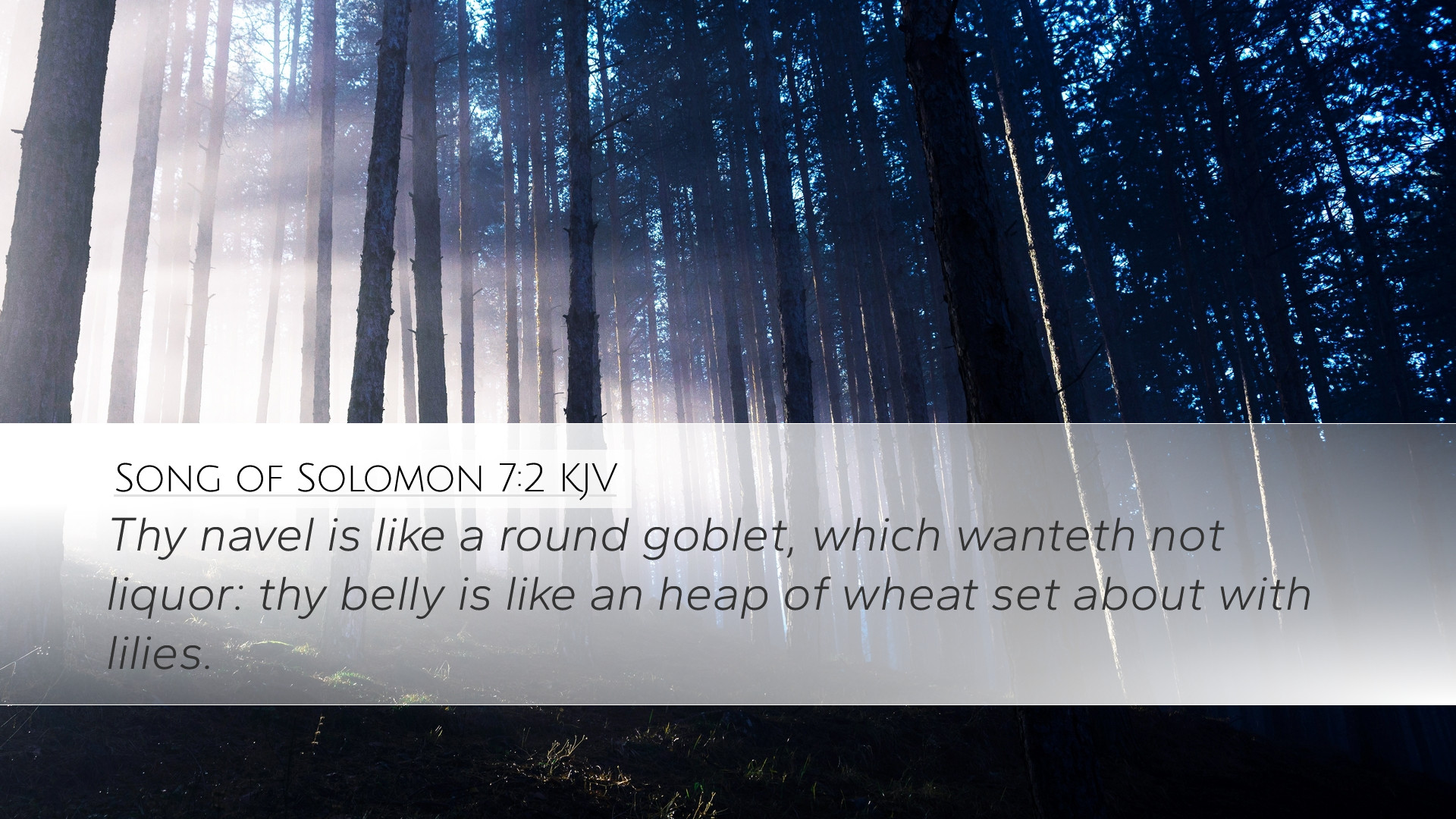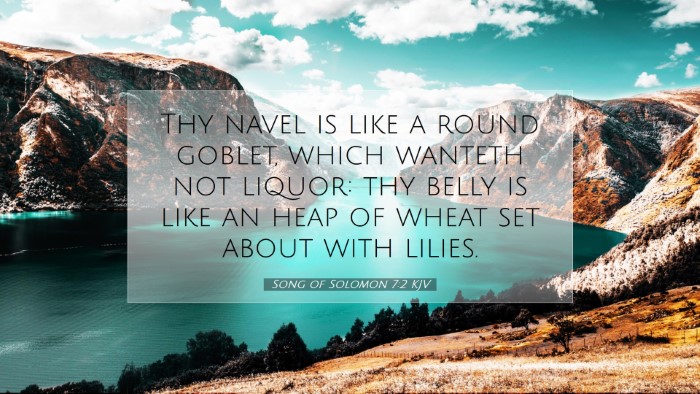Old Testament
Genesis Exodus Leviticus Numbers Deuteronomy Joshua Judges Ruth 1 Samuel 2 Samuel 1 Kings 2 Kings 1 Chronicles 2 Chronicles Ezra Nehemiah Esther Job Psalms Proverbs Ecclesiastes Song of Solomon Isaiah Jeremiah Lamentations Ezekiel Daniel Hosea Joel Amos Obadiah Jonah Micah Nahum Habakkuk Zephaniah Haggai Zechariah MalachiSong of Solomon 7:2
Song of Solomon 7:2 KJV
Thy navel is like a round goblet, which wanteth not liquor: thy belly is like an heap of wheat set about with lilies.
Song of Solomon 7:2 Bible Commentary
Commentary on Song of Solomon 7:2
The verse Song of Solomon 7:2 reads: “Thy belly is like an heap of wheat set about with lilies.” This poetic imagery serves as a fertile ground for pastoral application, academic exploration, and theological reflection. The beauty of the Song of Solomon, often interpreted allegorically or as a celebration of human love, invites deep analysis of its language and meaning.
Historical Context
Understanding the historical and literary context of the Song of Solomon is crucial. Traditionally attributed to Solomon, this book is unique in its absence of direct references to the Law, the priesthood, or the Temple. Instead, it employs rich metaphorical language to explore themes of love, desire, and intimacy.
Verse Analysis
In Song of Solomon 7:2, the expression “Thy belly” can be viewed through various interpretive lenses. Matthew Henry notes that the phrase symbolizes fertility and abundance, implying not merely physical allure but also vitality and the potential for life. The heap of wheat signifies nourishment, suggesting that the beloved offers sustenance not only in a physical sense but also emotionally and spiritually.
Imagery and Symbolism
- Heap of Wheat: This symbol represents not just physical beauty but also the concept of bounty and harvest. It speaks to the essential attribute of nurturing inherent in the beloved, a motif that resonates throughout the text.
- Set About with Lilies: Lilies often symbolize purity and beauty. The juxtaposition of the wheat with lilies creates a picture of harmony in nature and purity, suggesting a wholesome character that surrounds the beloved.
Theological Insights
From a theological perspective, the Song of Solomon illustrates the profundity of covenantal love. Albert Barnes emphasizes that love, when viewed through this lens, extends beyond mere physical attraction to encompass a deeper spiritual union. It underscores the idea that earthly relationships can mirror the divine relationship between Christ and His Church.
Lessons for Pastors and Theologians
- Nourishment in Relationships: Pastoral insights can be derived from contemplating how relationships serve to nourish one's spiritual life, paralleling how the Word of God sustains believers.
- Beauty in Creation: The purpose of physical beauty and attraction should lead to a deeper understanding of divine beauty and holiness.
- Unity in Diversity: Just as wheat and lilies co-exist, so do varied expressions of love and relationships within the Body of Christ provide strength and unity in diversity.
Exegetical Considerations
Adam Clarke brings forth the exegetical angle by analyzing the Hebrew words used in this passage. His insights illuminate how translations can sometimes obscure the richness of meaning encapsulated in the original language. The term “belly” could denote more than the physical; it may encompass the realm of emotions, desires, and inner thoughts.
Application for Scholarship
For scholars and students, a critical examination of the structure and literary tactics used in this verse can yield a wealth of academic engagement. Themes of desire, fulfillment, and the intertwining of the physical with the spiritual should be a focal point within theological discourse.
Conclusion
Song of Solomon 7:2 serves as a profound reminder of the beauty and complexity of love, both human and divine. By drawing on traditional commentaries and perspectives, readers can appreciate the depth of meaning within this passage. It calls for reflection on how physical beauty and emotional nurturing reflect deeper theological truths, encouraging a holistic approach to love that resonates through both the sacred and the secular realms of life.


